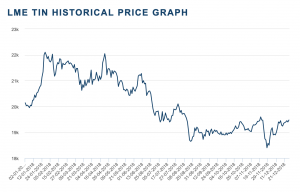ITA: Global Tin Use Exceeded Expectations In 2018
MetalMiner | Mar 15, 2019 08:45AM ET
According to a recent International Tin Association (ITA) report, global tin consumption bested expectations last year, despite trade headwinds created by tensions between the U.S. and China.
“Tin consumption in 2018 was stronger than previously anticipated, according to year-end data,” the ITA said in the report. “Despite a positive start to the year, expectations were revised downwards following the U.S.-China trade tensions and poor macroeconomic data. However, based on the most recent data, growth in tin use remained relatively robust, growing by 2.5% over the course of the year.”
By volume, tin usage increased by 9,000 tons in 2018 compared with 2017. An ITA survey of tin users — accounting for approximately 40% of tin use — had indicated expectations of 3% tin use growth. That was later moderated down to 1% before ultimately finishing up 2.5%.
As in most cases, China’s consumption of the metal accounts for a significant piece of the pie — 45%, according to the ITA.
Last year, however, China’s tin consumption dipped slightly, according to the report.
“While the Chinese solder market is impacted by electronics miniaturisation, there is growing demand in other areas, such as automotive, industrial and medical uses,” the ITA said. “Although Chinese consumption did decline slightly in 2018, this was offset by significant growth in overall tin consumption in the rest of the world (5%).”
What about 2019?
According to the report, preliminary forecasts suggest a contraction in tin use is on the way, but not a large one — that is, less than 1%.
“The overall slowdown of the Chinese economy is likely to be impacted by the on-going US-China trade tensions, although the two countries may be nearing a resolution,” the ITA release stated. “However, it is too early to comment on how a new trade deal would affect tin consumption.”
Despite a surge in January, the LME tin price trended downward throughout most of 2018, kicking off at $20,140 per ton and closing the year at $19,475 per ton.

LME tin price in 2018. Source: LME
by Fouad Egbaria

Trading in financial instruments and/or cryptocurrencies involves high risks including the risk of losing some, or all, of your investment amount, and may not be suitable for all investors. Prices of cryptocurrencies are extremely volatile and may be affected by external factors such as financial, regulatory or political events. Trading on margin increases the financial risks.
Before deciding to trade in financial instrument or cryptocurrencies you should be fully informed of the risks and costs associated with trading the financial markets, carefully consider your investment objectives, level of experience, and risk appetite, and seek professional advice where needed.
Fusion Media would like to remind you that the data contained in this website is not necessarily real-time nor accurate. The data and prices on the website are not necessarily provided by any market or exchange, but may be provided by market makers, and so prices may not be accurate and may differ from the actual price at any given market, meaning prices are indicative and not appropriate for trading purposes. Fusion Media and any provider of the data contained in this website will not accept liability for any loss or damage as a result of your trading, or your reliance on the information contained within this website.
It is prohibited to use, store, reproduce, display, modify, transmit or distribute the data contained in this website without the explicit prior written permission of Fusion Media and/or the data provider. All intellectual property rights are reserved by the providers and/or the exchange providing the data contained in this website.
Fusion Media may be compensated by the advertisers that appear on the website, based on your interaction with the advertisements or advertisers.